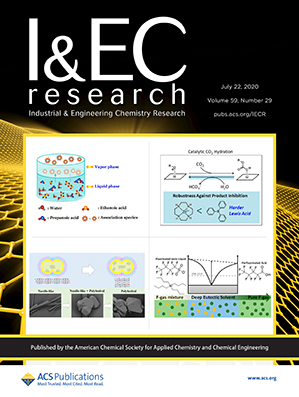|
Autores/as |
Abstract In recent years, the commercial blend R513A (integrated by R134a and R1234yf) has been proposed to replace R134a in air conditioning applications, given the lower global warming potential of R513A versus R134a. However, little is known about the best approach to recover these compounds by adequately separating them after the end of life of the equipment. In this contribution, we present a computational study of the capability of three fluorinated ionic liquids (imidazolium-based ILs with the [BF4]−, [PF6]−, and [TF2N]− anions) to selectively separate R134a and R1234yf from the R513A mixture. A thermodynamic analysis of the absorption of these gases in the selected ionic liquids has been performed with the soft-SAFT molecular-based equation of state (EoS), with the model validated using available experimental data. Soft-SAFT has then been used to predict the Henry constant, the solvation enthalpy and entropy, and the ideal selectivity in order to assess the best solvent to carry out the separation. Results indicate that [C6C1im][PF6] exhibits the highest ideal selectivity and the highest difference of molar enthalpy between both compounds. Hence, the ternary diagrams with this IL, R134a, and R1234yf are predicted, showing the competitive selectivity between both gases at the R513A mixture composition and evaluating the effect of pressure and temperature in the system. It has been observed that the competitive selectivity is similar to the ideal selectivity at the studied conditions. From the results obtained, it is recommended to work at low temperature and moderate pressure conditions to carry out this separation with [C6C1im][PF6]. |
Altmetrics
|
|
Publicación Industrial & Engineering Chemistry Research, 22 July 2020, v.59, n.29, p.13315-13324 |
||
|
Fecha de publicación 2020-07-22 |
||
|
DOI |



